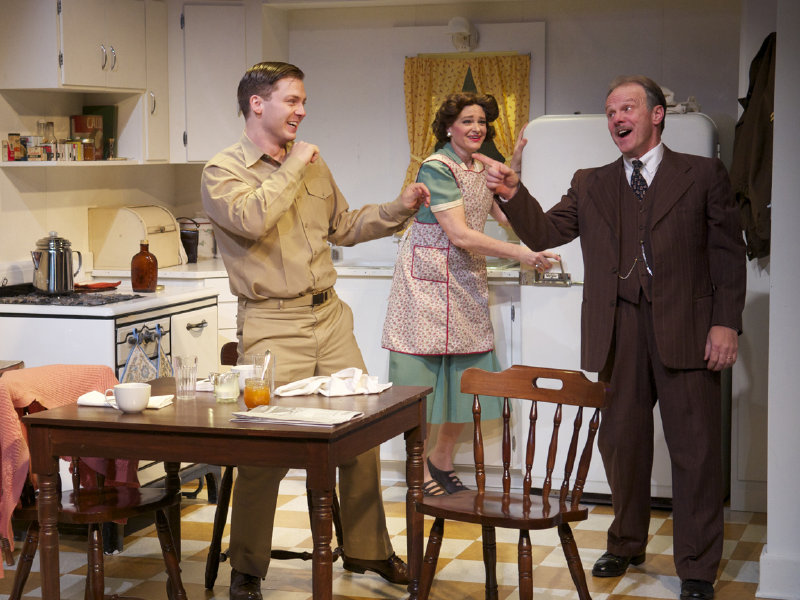The kitchen sink drama is a category of theater that revolves around family problems and conflict. The action takes place in a home, and, yes, the set usually includes a kitchen sink.
Frank D. Gilroy's 1965 Pulitzer Prize-winning play "The Subject Was Roses" defines the genre. The Milwaukee Chamber Theatre's production of it that opened last weekend defines how to do it.
Artistic director C. Michael Wright has elicited magnificent performances from James Tasse, Nicholas Harazin and Tami Workentin in a sensitive staging that sparkles with its attention to detail. Director and actors are doing some of their finest work in this three-character production.
A family triangle is the foundation of the play. Timmy Cleary arrives home in The Bronx in his army uniform after World War II and spends the first few nights with his parents. He is barely through the door when old tensions and resentments flare.
The young man was a pawn in his folks' marital discord before he went to war, and it appears that will resume with him back in the house. But Timmy has grown up, and his allegiance in the frequent skirmishes between mom and dad is less certain. Getting away from home and spending time in the army has given him a different perspective.
Playwright Gilroy gradually peels away the parents' rancor to reveal its causes. No surprising secrets are disclosed. The ordinary pockmarks and potholes of life, lived in close proximity by two people, can turn relationships and marriages sour.
Despite that, flames can still faintly flicker, and love can hide out beneath the bitterness. As the new saying goes, it's complicated.
All of the onstage action in "The Subject Was Roses" takes place in the side-by-side living room and kitchen at the Cleary home. Yes, we see a lot of the kitchen sink.
Tasse's feisty Irish father rings true with resounding authenticity. The character possesses a bare-knuckled charm as well as mercurial mood changes. The actor plays that with a palpable appeal and an ability to switch emotional gears with genuine fluidity.
Workentin's mother is just as real, smoldering with peevish antagonism. Her stiff physicality reflects an unhappy woman older than her years.
Harazin has distinguished himself as an actor in classical roles. Here he is the embodiment of a Bronx kid -- complete with accent -- with the new-found confidence of a chap who has survived the army and a war.
All three actors skillfully shade their performances to show us the familial love that still exists in their characters.
Gilroy's script is beautifully written, and Wright's meticulous direction burnishes this period piece with a stylish patina. Credit is also due designers Michelle Terese Grimm (costumes), R.H. Graham (set), Matthew J.A. Kerr (lights) and Devin Nee (sound) for creating an evocative environment.
When Bialystock & Bloom closed its doors in spring 2006, the three co-founders heaved large sighs of relief. No more administrative headaches. No more sleepless nights spent worrying about budget deficits.
But Jonathan West, the ringleader of the theatrical boys club, dropped a tantalizing hint during the company's final days. There might be another act in this show.
West went on to become the managing director at the Sunset Playhouse, where he produces a lot of community theater. Now he is making good on his suggestion that we hadn't seen the last of him as a producer of professional work.
Operating under the name Artsy Schmartsy, which is also what he calls his online arts blog, West is mounting David Sedaris' comic monologue "The Santaland Diaries" in the Sunset Playhouse's Studio Theatre Dec. 2-18. The one-man, one-act show about the author's experiences working as an elf at Macy's in New York was previously staged by Bialystock & Bloom, with Tom Klubertanz playing the department store Santa enabler. Klubertanz is a theater teacher at Oconomowoc High School who frequently acted with the old B&B.
West called him early this year, declaring, "I'm bored. Are you?" When the actor answered affirmatively, they set about planning Klubertanz's return to the elf suit.
Although the show is familiar -- John McGivern has also done it here -- the producing structure is quite unconventional this time around. Unwilling to go out on a financial limb, West raised seed money using an online tool called Kickstarter.
He sought to obtain half of the "Santaland Diaries'" $4,000 production budget from firm commitments of people to buy tickets. Through Kickstarter, he needed to sell 200 tickets at $20 a piece for his plans to go forward. A free baseball cap was included as a premium.
West set a deadline of mid-April to raise the money, and he easily went over the top, collecting $3,400 from the early buyers. Subsequent regular tickets sales have put the production in the black.
"It's the first time I have ever begun work on a show knowing all of the costs have been paid for," West told me this week. "My entire life at Bialystock & Bloom was based on hope. Tom (Klubertanz) and I said, let's base this show on reality."
While Klubertanz is recycling the old B&B elf costume, everything else about the production is new and fresh, West said. "We are looking at everything anew."
Theater and Arts Chat
I will be chatting about theater and the arts on successive Thursdays at the Jewish Museum Milwaukee Dec. 2 and 9. The programs will be from noon to 1 p.m., and participants are invited to bring their lunches or order in advance a kosher meal for $9.50.
The discussions are free to museum members and $3 per session for the general public. Make reservations by Nov. 30 by calling (414) 390-5730 or sending an e-mail to mollyd@milwaukeejewish.org.
Damien has been around so long, he was at Summerfest the night George Carlin was arrested for speaking the seven dirty words you can't say on TV. He was also at the Uptown Theatre the night Bruce Springsteen's first Milwaukee concert was interrupted for three hours by a bomb scare. Damien was reviewing the concert for the Milwaukee Journal. He wrote for the Journal and Journal Sentinel for 37 years, the last 29 as theater critic.
During those years, Damien served two terms on the board of the American Theatre Critics Association, a term on the board of the association's foundation, and he studied the Latinization of American culture in a University of Southern California fellowship program. Damien also hosted his own arts radio program, "Milwaukee Presents with Damien Jaques," on WHAD for eight years.
Travel, books and, not surprisingly, theater top the list of Damien's interests. A news junkie, he is particularly plugged into politics and international affairs, but he also closely follows the Brewers, Packers and Marquette baskeball. Damien lives downtown, within easy walking distance of most of the theaters he attends.



